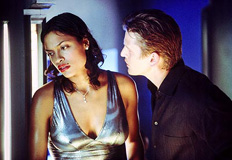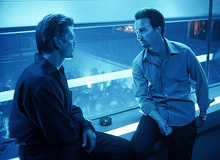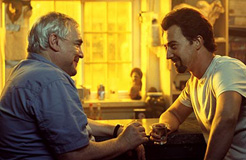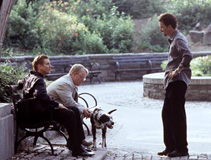25th Hour (Spike Lee, 2002)
 Iím sure no matter what itís critical reception, Spike
Leeís masterful 25th Hour will go down in history and trivia books as
the first major Hollywood production to directly address the terrorist attacks
of September 11th, but itís really so much more than that. Itís too damn
rare that such an intelligently conceived, tautly executed, politically astute
film gets made. This is an adult drama that has a distinct,
unmistakable viewpoint, and thatís nothing new for a Spike Lee film, but here
he shows an unusual amount of control over his considerable talent. Many of
Leeís past films have built up the level of tension until they flew right off
the rails (Bamboozled is the prime offender on those grounds), but 25th
Hour opens at fever pitch, spinning tension before the audience could
possibly understand why thereís any, and then continues to maintain that mood
for an astonishing amount of time. The filmís plot, which traces the actions
of convicted drug dealer Montgomery Brogan (Edward Norton) on his last day of
freedom before incarceration obviously lends itself to an air of anxiety, but
even the quietest moments here feel potentially explosive.
Iím sure no matter what itís critical reception, Spike
Leeís masterful 25th Hour will go down in history and trivia books as
the first major Hollywood production to directly address the terrorist attacks
of September 11th, but itís really so much more than that. Itís too damn
rare that such an intelligently conceived, tautly executed, politically astute
film gets made. This is an adult drama that has a distinct,
unmistakable viewpoint, and thatís nothing new for a Spike Lee film, but here
he shows an unusual amount of control over his considerable talent. Many of
Leeís past films have built up the level of tension until they flew right off
the rails (Bamboozled is the prime offender on those grounds), but 25th
Hour opens at fever pitch, spinning tension before the audience could
possibly understand why thereís any, and then continues to maintain that mood
for an astonishing amount of time. The filmís plot, which traces the actions
of convicted drug dealer Montgomery Brogan (Edward Norton) on his last day of
freedom before incarceration obviously lends itself to an air of anxiety, but
even the quietest moments here feel potentially explosive.
 Matter-of-factly set in a traumatized post-attack New York
City, thereís such profound unease permeating throughout that every
interaction threatens to become another Ground Zero. As catastrophic and
profound as the impact of that disaster is to these characters, the impact that
Montyís arrest has on them is just as devastating and more immediate.
In both cases, blame is assigned with reckless abandon and some terribly
messy feelings are kept bottled up. Montyís friendsí attempt to set all of
their tangled feelings aside so they can show him a good time before he leaves
them is willful delusion, but itís also a necessary coping mechanism as they
strive to achieve some fleeting sort of normalcy. Itís a situation so
difficult that it begs for empathy not just for the people who are losing Monty,
but also for the offender himself. The film doesnít excuse Montyís behavior,
but instead chases the more interesting question of whether or not heís
willing to take responsibility for what heís done. In doing so, the superb
script by first time screenwriter David Benioff pries into the demands that we
place on our legal system in a way that no American crime film since Dead Man
Walking has bothered to.
Matter-of-factly set in a traumatized post-attack New York
City, thereís such profound unease permeating throughout that every
interaction threatens to become another Ground Zero. As catastrophic and
profound as the impact of that disaster is to these characters, the impact that
Montyís arrest has on them is just as devastating and more immediate.
In both cases, blame is assigned with reckless abandon and some terribly
messy feelings are kept bottled up. Montyís friendsí attempt to set all of
their tangled feelings aside so they can show him a good time before he leaves
them is willful delusion, but itís also a necessary coping mechanism as they
strive to achieve some fleeting sort of normalcy. Itís a situation so
difficult that it begs for empathy not just for the people who are losing Monty,
but also for the offender himself. The film doesnít excuse Montyís behavior,
but instead chases the more interesting question of whether or not heís
willing to take responsibility for what heís done. In doing so, the superb
script by first time screenwriter David Benioff pries into the demands that we
place on our legal system in a way that no American crime film since Dead Man
Walking has bothered to.
 To say that the tension level remains at peak levels
throughout is not to imply that anything about 25th Hour is monotonous.
There are certainly peaks here, such as Montyís impassioned soliloquy,
delivered into a mirror, but they as powerfully put forward as they are they
never overpower the concerns at the movieís heart. Throughout the film,
characters drift in and out of the picture, effectively demonstrating how, even
at the worst of times, for better or for worse, no man is an island. The ripples
of Montyís misfortune pervade throughout, causing everyone close to him to
look closely at their relationship, and in doing so the script never falters.
Besides creating two credible, fully developed best friends for Monty (played by
the equally brilliant Phillip Seymour Hoffman and Barry Pepper), the film can
boast the most fully realized father-son relationship in recent memory. This focus on the ensemble turns this story
into one that examines the functions of community and camaraderie and its
ability to adapt under pressure, and because Lee places Monty in a communal
context, itís almost seamless when he expands the scope of his story to the
point where it incorporates civic and national concerns.
To say that the tension level remains at peak levels
throughout is not to imply that anything about 25th Hour is monotonous.
There are certainly peaks here, such as Montyís impassioned soliloquy,
delivered into a mirror, but they as powerfully put forward as they are they
never overpower the concerns at the movieís heart. Throughout the film,
characters drift in and out of the picture, effectively demonstrating how, even
at the worst of times, for better or for worse, no man is an island. The ripples
of Montyís misfortune pervade throughout, causing everyone close to him to
look closely at their relationship, and in doing so the script never falters.
Besides creating two credible, fully developed best friends for Monty (played by
the equally brilliant Phillip Seymour Hoffman and Barry Pepper), the film can
boast the most fully realized father-son relationship in recent memory. This focus on the ensemble turns this story
into one that examines the functions of community and camaraderie and its
ability to adapt under pressure, and because Lee places Monty in a communal
context, itís almost seamless when he expands the scope of his story to the
point where it incorporates civic and national concerns.
 Such talk makes 25th Hour sound like more drudgery
than it is, but thatís because itís the rare entertaining genre film that
manages to be about something pertinent, and itís difficult not to get excited
by that. Though the movie is relatively light on action, Lee never allows the
loquaciousness to stomp out his visual style. He uses his heightened images, his
superbly mixed soundtrack, and, perhaps most importantly, his frank sentiments
without embarrassment. The boldness of the filmmaking suggests remarkable faith
in the message being sold, and nowhere is that confidence more apparent than in
the filmís sure-to-be-divisive final ten minutes. For this viewer, Leeís
most audacious touches are the ones that pay off most wonderfully here. Because
compromise doesnít seem to be an issue on so many levels in 25th Hour,
itís disappointing that some of the storyís structure seems more obligatory
than necessary. Thereís a whodunit plot attached that is vaguely unsatisfying
and an interrogation scene that seems to exist solely so that two scenes without
Monty are split up, but even those weaker moments have dialogue thatís so well
written and delivered that complaining seems foolish.
Such talk makes 25th Hour sound like more drudgery
than it is, but thatís because itís the rare entertaining genre film that
manages to be about something pertinent, and itís difficult not to get excited
by that. Though the movie is relatively light on action, Lee never allows the
loquaciousness to stomp out his visual style. He uses his heightened images, his
superbly mixed soundtrack, and, perhaps most importantly, his frank sentiments
without embarrassment. The boldness of the filmmaking suggests remarkable faith
in the message being sold, and nowhere is that confidence more apparent than in
the filmís sure-to-be-divisive final ten minutes. For this viewer, Leeís
most audacious touches are the ones that pay off most wonderfully here. Because
compromise doesnít seem to be an issue on so many levels in 25th Hour,
itís disappointing that some of the storyís structure seems more obligatory
than necessary. Thereís a whodunit plot attached that is vaguely unsatisfying
and an interrogation scene that seems to exist solely so that two scenes without
Monty are split up, but even those weaker moments have dialogue thatís so well
written and delivered that complaining seems foolish.
* * * *
12-18-02
Jeremy Heilman